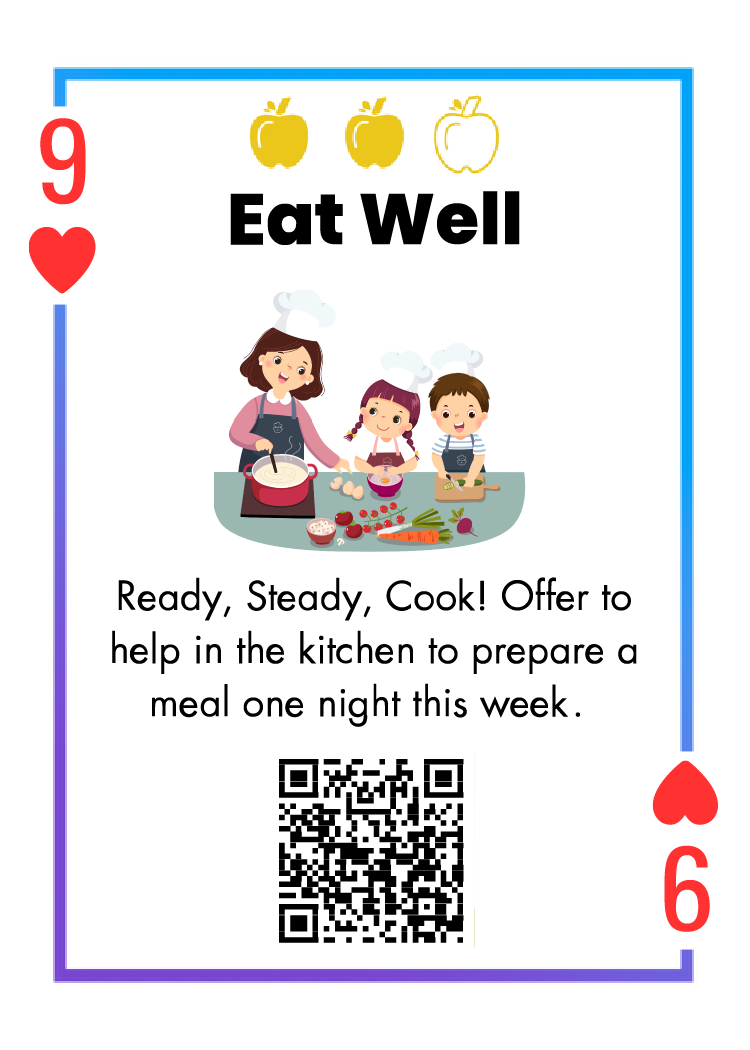The 1% Club




9 of Hearts
Ready, Steady, Cook!

- Check out some easy recipes online, in a cookbook or in the videos below and choose a meal to cook.
- Choose something easy to begin with and then choose something more difficult to test your skills!
- Head to the shops with a friend or family member to pick up the ingredients.
- Read the recipe and instructions all the way through before you start.
- If you need the oven, it may need to be preheated.
- You’ll need to prepare all the food in the recipe – cut, grate, shave, crumb, slice and dice! Be careful when using knives and scissors!
Preparing your own food helps you appreciate the food you’re about to eat.
The time it takes to prepare might remind you to slow down when eating to really enjoy it and be mindful of what you’re eating.
By preparing foods, it might encourage you to taste foods you’ve never tried before. Most importantly, it’s fun to prepare food for yourself and others.
A US study of primary school children found those who helped in meal preparation had improved food intake.
They also felt happier and more in control, which encourages healthier eating habits. 2
Small changes CAN make a big difference – that’s what The 1% Kids’ Club is all about!
Have a dig through your cooking books at home, or head to a local library to check out some celebrity chefs’ favourite dishes for kids. Or books involving their favourite characters, like The Gruffalo Cookbook to get them excited!
Have a go at some of these easy recipes….
https://www.bbcgoodfood.com/recipes/collection/kids-cooking-recipes
Use recipes and cooking as a fun way to learn many skills.
Can you transform some of the children’s learning into a more hands-on approach?
In Maths they are learning about measurement, fractions, ratios, and more.
https://www.learningresources.co.uk/blog/maths-fun-activities-to-teach-maths-through-cooking/
Food literacy activities can support a variety of other literacy skills including reading a recipe, writing a recipe and knowing the vocabulary of ingredients and different foods.
Garden to Table is an exciting charity introduced to support schools take the learning out of classroom and into the garden or kitchen. Teaching thousands of Kiwi kids the knowledge and skills to have a lifelong impact on their wellbeing and food choices. This isn’t just good for them, but also for our planet! By digging in the dirt and getting their hands messy, they learn how to grow yummy veggies and cook delicious meals. What to learn more? Check out: https://gardentotable.org.nz/
You could begin by having younger children helping with the food preparation to eventually being able to hand over to older children to make a meal for you!
This will teach children about hygiene, safety using utensils correctly, reading skills, maths skills, reading the time, food groups, food textures and many more.
Top tips from Jamie Oliver and Mardi Michels
1. Make the time – set a couple of hours aside on the weekend to make something tasty!
2. Find the right recipes – start with the basics with easy-to-follow instructions.
Don’t worry if your kids are ‘picky’ eaters – involving them in meal prep, regardless of their dislike, can encourage interest in cooking to discovery new tastes.
- Tips for getting cooking with kids. www.jamieoliver.com. Jamie Oliver.
Available at: https://www.jamieoliver.com/features/tips-for-getting-cooking-with-kids/ - van der Horst, K., Ferrage, A. and Rytz, A. (2014). Involving children in meal preparation. Effects on food intake. Appetite, 79, pp.18–24.
doi:https://doi.org/10.1016/j.appet.2014.03.030.

